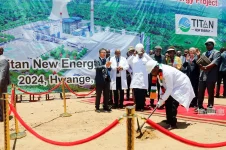Dr. Sydney Gata, the executive chairman of ZESA Holdings, has said that the current electricity supply problems in Zimbabwe will be solved once the country finishes building 18 power projects. These projects will create nearly 4,000 megawatts of electricity in the next two years.
President Mnangagwa recently had a ground-breaking ceremony for a 720-megawatt waste-to-thermal-coal power plant in Hwange District. This plant is one of the big steps being taken to make more electricity in Zimbabwe and stop power outages.
The country's energy sector has been hurt by climate change. It has made the water levels at Kariba Hydro-Power Station very low, which has greatly reduced how much electricity it can make.
Dr. Gata said that the new power investments will permanently fix the electricity supply problems. Titan New Energy has put $1 billion into a thermal plant in Hwange and a solar plant in Gweru. It is one of 18 projects that will completely get rid of power shortages in the next two years.
Zimbabwe is working with various independent power producers on these projects. Some of them are Pretoria Portland Cement, Zimasco, Dinson Steel, Afrochine, ZZEE, Titan, and several other Chinese investors. They are building six thermal power plants, many solar energy plants, and a gas project.
Dr. Gata said that Zimbabwe will be the first country in the SADC region to have such a big surplus of energy from private producers. This extra energy will be sold to other countries in the region.
The Minister of Energy and Power Development, Edgar Moyo, said that the government is working on thorough measures to make sure that everyone can get affordable energy. These measures include adding solar power to the Kariba Hydro-Power Station, giving ZESA more resources, and other things.
Minister Moyo said that the power outages are happening because the Kariba station is making less electricity due to a drought caused by climate change. He said that this will be fixed by combining different power sources, among other measures.
He thanked the people of Zimbabwe for being patient during these difficult times with the power supply. He also said that the government will keep encouraging private sector investment in the country's power sector through engagement and support.
President Mnangagwa recently had a ground-breaking ceremony for a 720-megawatt waste-to-thermal-coal power plant in Hwange District. This plant is one of the big steps being taken to make more electricity in Zimbabwe and stop power outages.
The country's energy sector has been hurt by climate change. It has made the water levels at Kariba Hydro-Power Station very low, which has greatly reduced how much electricity it can make.
Dr. Gata said that the new power investments will permanently fix the electricity supply problems. Titan New Energy has put $1 billion into a thermal plant in Hwange and a solar plant in Gweru. It is one of 18 projects that will completely get rid of power shortages in the next two years.
Zimbabwe is working with various independent power producers on these projects. Some of them are Pretoria Portland Cement, Zimasco, Dinson Steel, Afrochine, ZZEE, Titan, and several other Chinese investors. They are building six thermal power plants, many solar energy plants, and a gas project.
Dr. Gata said that Zimbabwe will be the first country in the SADC region to have such a big surplus of energy from private producers. This extra energy will be sold to other countries in the region.
The Minister of Energy and Power Development, Edgar Moyo, said that the government is working on thorough measures to make sure that everyone can get affordable energy. These measures include adding solar power to the Kariba Hydro-Power Station, giving ZESA more resources, and other things.
Minister Moyo said that the power outages are happening because the Kariba station is making less electricity due to a drought caused by climate change. He said that this will be fixed by combining different power sources, among other measures.
He thanked the people of Zimbabwe for being patient during these difficult times with the power supply. He also said that the government will keep encouraging private sector investment in the country's power sector through engagement and support.












